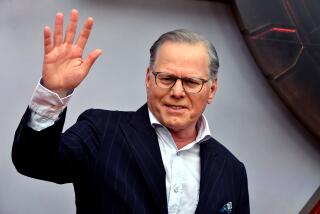They’re Wishing That Auld Acquaintance Would Be Forgot
- Share via
Gearing up for New Year’s can be depressing.
Some people feel compelled by this arbitrary date on the calendar to take stock of themselves, evaluating whether their lives and careers are progressing as they should. A few make matters worse by comparing themselves with others, especially when reading about some 26-year-old technology guru who has amassed a fortune equal to a small country’s gross national product.
To lift flagging spirits, then, it seemed a good time to reflect on a dozen instances in which the television industry’s rich and powerful have at least as much reason to be morose about 2000 as you do.
Michael Ovitz: When publicists fanned out across Hollywood to tout that the former super-agent had made a big splash in television this season, they knew the campaign could backfire if Ovitz’s shiny new ship began to take on water.
Time to get a bucket. Of four Ovitz-backed series to premiere this fall, “The $treet” and “Madigan Men” have been canceled, and “The Weber Show” (formerly “Cursed”) and “Grosse Pointe” are struggling. A fifth project from novelist Michael Crichton didn’t materialize, and Ellen DeGeneres’ proposed series is being reworked.
Ovitz’s flavor-of-the-moment company has absorbed sizable financial losses without the kind of studio backing that would soften the blow. Former NBC executive Don Ohlmeyer once famously referred to Ovitz as “the antichrist,” but one would imagine the antichrist would have had better luck. At least, he seemed to in those “Omen” movies.
Paramount’s syndication division: It’s not a surprise that radio host Laura Schlessinger hasn’t set the world on fire in television. That leap isn’t always easy, as Rush Limbaugh, Howard Stern and a host of others can testify.
The surprising part is Paramount executives seemed so unprepared for the firestorm caused and ill will engendered--including among many of its employees--by providing Schlessinger, whose comments on her radio show angered many gay-rights activists, with a TV forum.
Schlessinger certainly has the right to speak her mind, but Paramount officials either didn’t do their homework or arrogantly thought they could ignore critics, mishandling the situation in a manner that left them under siege through much of 2000.
Oh, well, can’t wait for those new Paramount talk shows “Louis Farrakhan,” “Matt Drudge” and “Bill’s Angels: Monica, Gennifer & Paula.”
Sons of “Seinfeld”: Someone had to be the first “Seinfeld” alumnus to test the prime-time rat race, but Michael Richards’ reunion with NBC appeared doomed before he entered the maze.
Agents for Jason Alexander (whose 2000 resume included the “Rocky and Bullwinkle” movie) and Julia Louis-Dreyfus (she sprinkled fairy dust in ABC’s “Geppetto”) couldn’t be especially thrilled, either, to see a “Seinfeld” co-star fail to master his domain. Series co-creator Larry David’s show, meanwhile, has been just a marginal draw even by HBO’s less exacting ratings standards . . . not that there’s anything wrong with that.
Television news: A hot medium driven by its immediacy demonstrated the pitfalls and pratfalls of what is usually an asset, from premature election-night calls to fumbling live analysis of the ultimate Supreme Court decision. Print reporters get it wrong at times too, but broadcasters appear to revel in flying without a net, and the landings of late haven’t been pretty.
Sitcom writers: Not only have networks churned out a singularly unimpressive array of comedies, but the new shows generating any buzz have largely been dramas or had no writers at all. It wasn’t much of a year for development executives either, but at least they don’t have to contemplate carrying signs that say “Unfair” outside Fox and Disney next summer.
Bryant Gumbel: Despite those pandering “Survivor” interviews and tie-ins, his CBS morning show remains little more than a ratings afterthought. On the plus side, he escapes the year with more credibility than CBS newsreader-turned-”Big Brother”-host Julie Chen. As she’d say of 2000, “Wow! That was intense!”
Barry Diller, chairman of USA Networks: It’s hard to say what’s more embarrassing, that the media mogul desperately needed World Wrestling Federation matches to power his USA Network or that he lost the franchise to Viacom, which quickly saw ratings for its TNN channel increase tenfold when wrestling was on.
Diller then announced a deal to sell a group of TV stations that USA owns to the Spanish-language Univision network, tacit admission his aspirations to build those stations into a strong independent alternative or another broadcast network hadn’t panned out.
The Internet on TV: Fox’s “FreakyLinks,” a drama supposed to be driven in part by its Internet component, has failed to make a ratings connection, and ABC’s “Dot.Comedy” was yanked after a single telecast. There must be a brilliant new-media application out there for prime-time series, but nobody has figured it out yet. Maybe the year of the Hal 9000 computer will provide more luck.
Dick Ebersol, chairman of NBC Sports: Michael Jordan-less NBA basketball ratings kept falling, NBC lost its portion of major league baseball rights to Fox, and ratings for the Olympics tumbled like a Russian gymnast. Fortunately, NBC has four Olympics over the next eight years to try to set the bar higher.
O.J. Simpson: First he was thwarted in his attempt to block CBS from showing the miniseries about his legal team, “American Tragedy,” and then almost nobody watched it. The Juice is on the loose, but no one cares anymore.
Oxygen: The high-profile cable and Internet venture aimed at women--backed by Oprah Winfrey and other TV heavyweights--has yet to have any real impact and was recently forced to lay off some employees. We all need to breathe, but there’s still room for doubt as to who really needs Oxygen.
Gen. Barry McCaffrey, former White House drug czar: Before his resignation, McCaffrey’s office fell victim to controversy regarding its practice of using financial incentives to encourage broadcasters to incorporate anti-drug messages into TV shows--coming perilously close, some felt, to government intrusion in program content. Questions have also been raised about the efficacy of the $150 million the Office of National Drug Control Policy spent annually on advertising and whether the drug control policy office was overcharged by its media-buying firm.
We hope this roster makes some of you feel better, relatively speaking. In the face of years like these, even McCaffrey could probably benefit from a few legal adult beverages to ring in the New Year.
*
Brian Lowry’s column appears on Wednesdays. He can be reached by e-mail at brian.lowry@latimes.com.
More to Read
The complete guide to home viewing
Get Screen Gab for everything about the TV shows and streaming movies everyone’s talking about.
You may occasionally receive promotional content from the Los Angeles Times.






